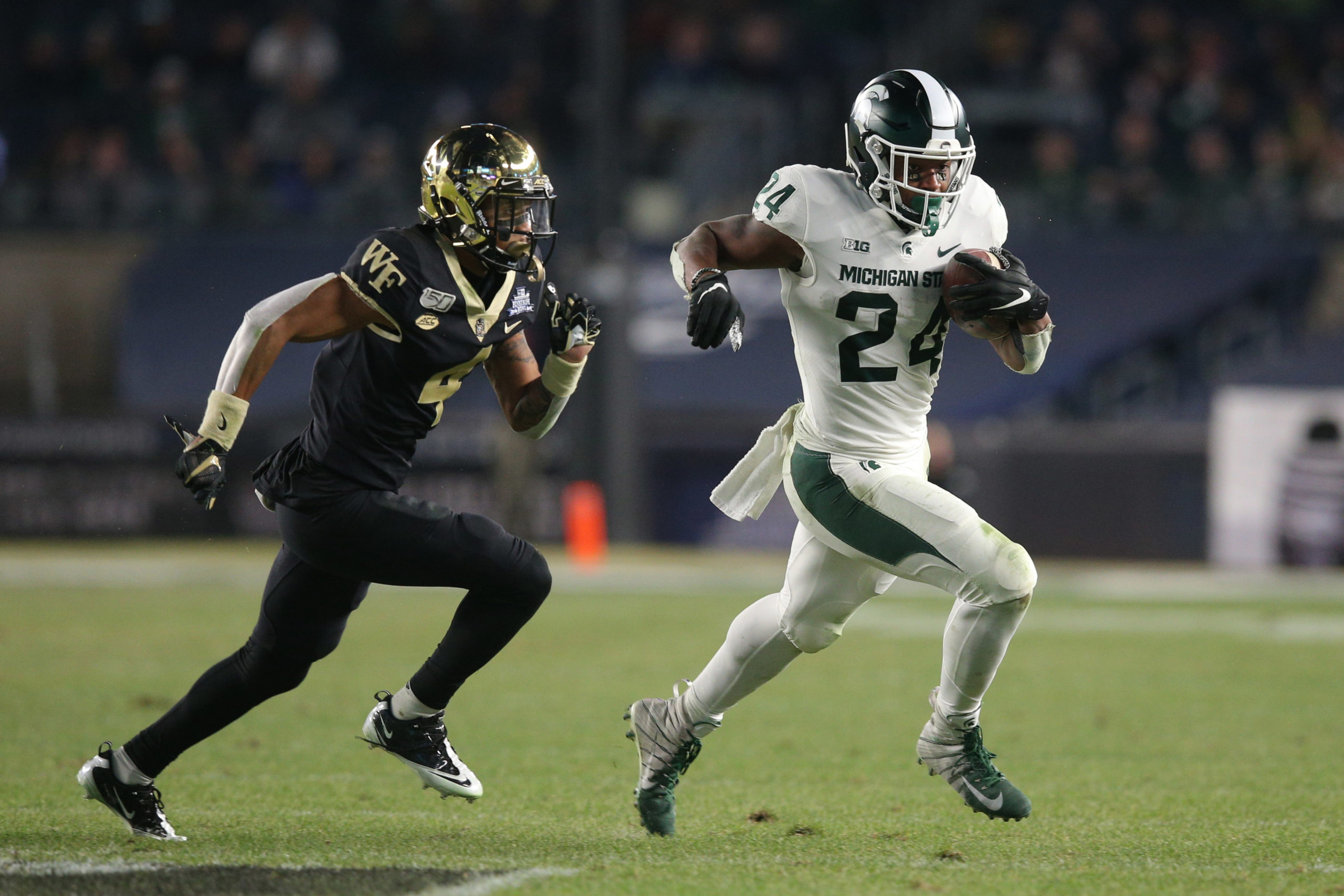Ad Disclosure

Make no bones about it, the Michigan State offense has become stale.
New coach Mel Tucker and company need to freshen things up in East Lansing — mostly likely a multi-year task — if the Spartans are to return to their Mark Dantonio heyday of 2015 (B1G title and College Football Playoff berth).
New offensive coordinator Jay Johnson followed Tucker from Colorado and wants to take a more balanced approach than his predecessor, but he inherits a unit that was shut out by Wisconsin and scored just 1 touchdown in six other games in 2019.
Replacing QB Brian Lewerke, the school’s all-time leader in yards from scrimmage, only compounds Tucker and Johnson’s challenge, not to mention games against three of the nation’s upper echelon defenses in Ohio State, Penn State and Michigan.
The Spartans’ offensive success will be largely contingent on the type of season running back Elijah Collins produces. But just how much of a difference can the one proven offensive star make in helping Michigan State avoid just its second season without a bowl appearance in the last 14 years?
Personnel: Worse
Key losses: Brian Lewerke, QB; Cody White, WR; Darrell Stewart, WR; Tyler Higby, OL
Key returnees: Elijah Collins, RB; Tre Mosley, WR; Jalen Nailor, WR; Matt Dotson, TE; Matt Allen, C
Potential breakout player: Jayden Reed, WR
Given the loss of key talent, experience could be a saving grace — thanks largely to the revolving door of starters used in 2019 stemming from a bevy of injuries. The offensive line alone saw 11 starters and seven different starting combinations. The biggest talent question mark is which player will fill the void left by Lewerke’s graduation. While the receiving corps took a hit with Cody White’s surprise defection for the NFL, whoever is throwing passes for the Spartans has a fairly deep list of options with at least a few catches on their respective resumes. Until one of those options emerges as a threat, though, it’s tough to say there are upgrades at any position this year.
Passing offense: Worse
Replacing Lewerke, statistically one of the best quarterbacks in program history, is a daunting task. Losing the top three pass-catchers from the season prior while installing a new offense during a pandemic, well, that’s even more challenging.
It’s not a sure thing that junior Rocky Lombardi is next in line at QB despite his seeing more game action — including three starts in 2018 — than the rest of the quarterback room combined. He has 812 career passing yards, but on just 42.9 percent accuracy with 5 interceptions and only 3 TDs. His experience, however, may prove even more valuable given the nature of the offseason and lack of spring reps for his counterparts. Sophomore Theo Day and redshirt freshman Payton Johnson will provide competition for the starting gig.
Cody White turning pro a season earlier than expected is certainly a big loss but is one that exciting playmaker Jalen Nailor should be able to fill despite playing in just four games in 2019 due to a broken foot. Throw in Tre Mosley, who debuted last year with 21 catches in his freshman season, and 2018 Freshman All-American Jayden Reed, a transfer from Western Michigan, and the receivers potentially could hold pace with their middle-of-the-pack status of 2019, when the group ranked sixth in the Big Ten.
Rushing offense: Better
Collins is back for his second season as the unquestioned starter, but returns as the only real option, given that the team’s second-leading rusher in 2019 was Lewerke.
Collins finished 2019 with 988 yards and 5 touchdowns on 222 carries behind an offensive line riddled with injuries. His backup Anthony Williams rushed for just 118 yards.
Only Purdue had fewer yards on the ground in the Big Ten than Michigan State’s 128.2 per game, and that’s saying something given the nature of the Boilermakers’ conference-leading passing game.
Despite its lack of success a year ago, Sparty is poised to improve upon its 3.6 yards per carry if there is any sort of return to the norm in offensive line health, especially with another year of experience under Collins’ belt. Couple a new starting quarterback with a new offensive scheme, and Michigan State will likely rely heavily upon its run game in the early weeks before it fully takes the training wheels off the offense.
Special teams: Even
From a kicking standpoint, there’s not too much to improve upon. Matt Coghlin returns for his fourth season as the program’s all-time leader in PAT percentage, a perfect 91-for-91. A 2018 first team All-Big Ten selection and 2019 honorable mention, Coghlin struggled with consistency last year, connecting on 22 of 32 field goal attempts.
The return game failed to strike fear in any opponent’s heart last year, failing to score and averaging just 18.9 and 6.4 yards in the kick return and punt return games respectively. While top returners Darrell Stewart and Brandon Sowards are gone, Anthony Williams and Jalen Nailor are more than capable of filling in.
Overall: Even
Given that Tucker, a coach with a rich defensive pedigree, will be installing a new offense with a giant question mark at the quarterback position, asking to do much more than the seven-win season from 2019 is a tall order.
The success of the Spartans offense will hinge almost solely on the shoulders of a successful campaign from the new starting quarterback. If the quarterback can get comfortable behind a veteran offensive line and unleash the talent of his young receivers, Tucker and Michigan State just may lay the foundation for a more promising season in 2021.
Penn State grad Thomas Schlarp covers the Nittany Lions, Michigan State and other B1G trends for Saturday Tradition. Follow him on Twitter @TSchlarp.